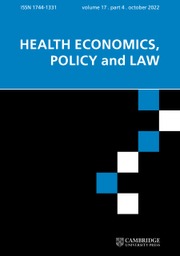Crossref Citations
This article has been cited by the following publications. This list is generated based on data provided by
Crossref.
PAOLUCCI, FRANCESCO
SCHUT, ERIK
BECK, KONSTANTIN
GREß, STEFAN
VAN DE VOORDE, CARINE
and
ZMORA, IRIT
2007.
Supplementary health insurance as a tool for risk-selection in mandatory basic health insurance markets.
Health Economics, Policy and Law,
Vol. 2,
Issue. 2,
p.
173.
Sidorenko, Alexandra A.
and
Butler, James R.G.
2007.
Financing Health Insurance in Asia Pacific Countries.
Asian-Pacific Economic Literature,
Vol. 21,
Issue. 1,
p.
34.
Greß, Stefan
2008.
Encyclopedia of Public Health.
p.
657.
Paolucci, Francesco
Prinsze, Femmeke
Stam, Pieter J. A.
and
van de Ven, Wynand P. M. M.
2009.
The potential premium range of risk-rating in competitive markets for supplementary health insurance.
International Journal of Health Care Finance and Economics,
Vol. 9,
Issue. 3,
p.
243.
Connelly, Luke B.
Paolucci, Francesco
Butler, James R.G.
and
Collins, Paul
2010.
Risk equalisation and voluntary health insurance markets: The case of Australia.
Health Policy,
Vol. 98,
Issue. 1,
p.
3.
Armstrong, John
2010.
Risk equalisation and voluntary health insurance markets: The case of Ireland.
Health Policy,
Vol. 98,
Issue. 1,
p.
15.
Van de Ven, Wynand P. M. M.
2011.
Risk adjustment and risk equalization: what needs to be done?.
Health Economics, Policy and Law,
Vol. 6,
Issue. 1,
p.
147.
Paolucci, Francesco
2011.
Health Care Financing and Insurance.
Vol. 10,
Issue. ,
p.
1.
Sauter, Wolf
2011.
Health Insurance and EU Law.
SSRN Electronic Journal,
Robson, Alex
and
Paolucci, Francesco
2012.
Private Health Insurance Incentives in Australia: The Effects of Recent Changes to Price Carrots and Income Sticks.
The Geneva Papers on Risk and Insurance - Issues and Practice,
Vol. 37,
Issue. 4,
p.
725.
Roos, Anne-Fleur
and
Schut, Frederik T.
2012.
Spillover effects of supplementary on basic health insurance: evidence from the Netherlands.
The European Journal of Health Economics,
Vol. 13,
Issue. 1,
p.
51.
Radermacher, Ralf
Srivastava, Siddharth
Walsham, Matthew
Sao, Chhorn
and
Paolucci, Francesco
2016.
Enhancing the Inclusion of Vulnerable and High-Risk Groups in Demand-Side Health Financing Schemes in Cambodia: A Concept for a Risk-Adjusted Subsidy Approach.
The Geneva Papers on Risk and Insurance - Issues and Practice,
Vol. 41,
Issue. 2,
p.
244.
Paolucci, Francesco
Sequeira, Ana R.
Fouda, Ayman
and
Matthews, Andrew
2018.
Risk Adjustment, Risk Sharing and Premium Regulation in Health Insurance Markets.
p.
181.
Velasco, Carolina
Henríquez, Josefa
and
Paolucci, Francesco
2018.
Risk Adjustment, Risk Sharing and Premium Regulation in Health Insurance Markets.
p.
235.
Maia, Ana Carolina
and
Carvalho, João Vinícius de França
2020.
A espiral de antisseleção no mercado brasileiro de planos de saúde individuais.
Estudos Econômicos (São Paulo),
Vol. 50,
Issue. 3,
p.
535.
Turquet, Pascale
and
Martin, Philippe
2021.
Private Health Insurance and the European Union.
p.
247.
Morton, Andrew J. B.
2021.
European Health Care Systems and the Emerging Influence of European Union Competition Policy.
Journal of Health Politics, Policy and Law,
Vol. 46,
Issue. 3,
p.
467.




